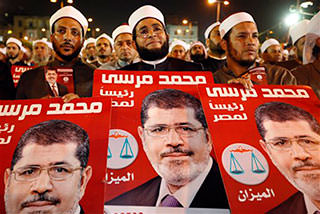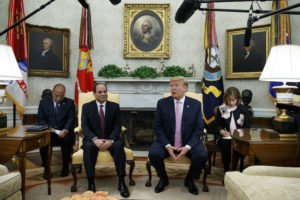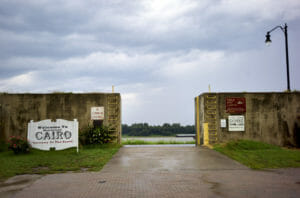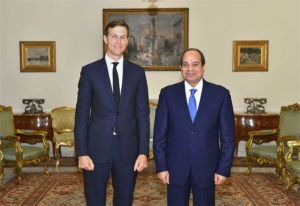Dispatches From Cairo: Testing Democracy
Here in Cairo every conversation turns to this week's presidential election, hopefully the first true democratic election in the country's history.
We asked Lauren Unger-Geoffroy, an international artist who lives in Cairo, to share her perspective of life in Egypt after the revolution. In this entry, she writes about Egypt’s imminent presidential election.
Here in Cairo every conversation turns to this week’s presidential election, hopefully the first true democratic election in the country’s history. Since Egypt’s first presidential debate May 10, which featured the two leading candidates — liberal Amr Moussa and moderate Islamist Abdel Moneim Aboul Fotouh — every person has reflected, discussed and rethought their choices.
It has been an amazing few weeks of logical discussions, without violence or blood. People are truly searching for a best choice, and beginning to really believe they can decide the future of their nation. In every cafe, shop, office, street and home, people are calmly exchanging their thoughts and opinions and weighing pros and cons.
It remains to be seen whether they will understand and accept the principle of democracy: The candidate chosen by the majority becomes the president, and the other contenders must yield to the voters’ decision, game over.
I watched most of the four-hour marathon debate over pastries and 7UP at the home of my former neighbors and close friends, a retired general and his wife with whom I had passed many evenings during the first 18 days of the revolution.
The apartment building where the general and his wife live, and I used to also, is on an isolated dark street. Near the end of the time I lived there, it had been evacuated except for my two female roommates and me, a Chinese guy who kept telling us that we would be raped and killed, and the general and his extended family, who own the building. We had no TV in our flat, where all that remained were our mattresses and piles of books. We were all about to move. I was in the middle of relocating to the apartment building I live in now when it was firebombed and the area became inaccessible. So I stayed on with my roommates huddled in our empty apartment, listening to the shots and explosions and yelling outside through bolted shutters with lights out so as not to reveal our presence. Severe curfews were in place, tanks and thugs were everywhere, gunshots were coming from all directions and men stood guard with baseball bats and sabers around campfires at street intersections, serving as block patrols. The telephone and Internet had been cut off, and food was scarce.
Back then, we gathered cautiously downstairs in front of the general’s TV while his son and grandson took their turns as street guards with the other men of the block. I remember how the general spoke of President Hosni Mubarak’s appointing Ahmed Shafik as prime minister at that time. The general knew Shafik well, having fought beside him, and didn’t like him. The general had been invited to state military affairs and honor dinners, but he had no love for those he considered corrupt and he was happy for the revolution.
As we watched the debate two weeks ago, I was looking forward to seeing how the general felt about the candidates, knowing that he was somewhat religious and sympathetic to the Muslim Brotherhood, following a few of its religious speakers. Before the debate started, he told me he had no preference for one candidate over the other.
Two hours into it, Moussa’s lack of charisma, jerky body movements and no sense of conviction or confidence turned us off compared to the more appealing Aboul Fotouh. However, by the end of three hours Aboul Fotouh had been trapped into revealing his own insincere currying of favor from opposing camps, and we soured on him as well. The questions were well chosen — and the traps were set for both.
Moussa was forced to say that Israel is the enemy, and was goaded into losing his cool, becoming aggressive and insulting.
Aboul Fotouh was forced to say that a man could worship as he wanted, in regard to the Quran-ordered Shariah law that states if a Muslim converts to Christianity he must be killed. He had previously confirmed the opposite to the Salafists, whom he was also courting.
After three hours, the general had had enough of both of them and switched channels — first to watch wrestling, which he is convinced is true blood sport, and then to the prepared interview made by the Muslim Brotherhood with its candidate, Mohamed Morsi, who had declined to participate in the debate. The well-rehearsed Morsi came across as a savior, pure, honest, simple, warm, noble and pious yet reasonable.
I couldn’t take more than three and a half hours, so the general and his wife drove me home around 1 a.m. I asked him who they would vote for (as he, of course, decides for both of them) and he laughed, saying he wasn’t going to vote. He had never voted, he said, as there was never any point before and he didn’t want his name on anything. You never know what someone might do with it.
In the days after the debate, I talked with friends and people in the street. People of all socio-political tendencies had watched it and were talking about how they were unimpressed by the two candidates. Many said they suddenly felt a new spark of infatuation with either Morsi or one of three other lesser-known, non-majority candidates.
I have been hearing a surprising number of people say that they are considering Shafik, the former commander of the Egyptian air force, despite the fact that the street’s reaction to his election would cause a revolution more massive than we have seen yet, and the army would have to kill all the protesters. He has been helped by national media propaganda putting him forward in shamelessly invented polls, the usual tricks.A few days ago I had the opportunity to accompany my friend Magda, who had been a supporter of candidate Omar Suleiman and later Shafik, to a rally for Shafik. Once the doors closed on the 3,000-plus invitees and Shafik took to the podium to speak, shouts arose of “Feloul! Feloul!” (“leftovers”), the people’s name for the remnants of the deposed Mubarak’s corrupt regime. Police ushered the protesters out but not before their outcry and the lack of reaction or intelligent discourse from Shafik revealed to all present that he was not worth the people burning the country down and the army filling the streets with blood.
Magda, who hated the revolutionaries to the point of not caring if the army had to kill them, confided to me that she had changed her mind about backing Shafik. He is no good, she told me. The only answer is Moussa.
Some of the lesser-known candidates, notably the Nasserist socialist Hamdeen Sabahi, a longtime activist, supporter of the peasants and advocate of a tax on the extremely wealthy, have been gaining some momentum, but not enough to shake the front-runners.
The Muslim Brotherhood has run an organized and impressive campaign. It is using the tried and true method of helping the people and setting up information kiosks and tents all over. It has one in front of my building, where its backers give away small packages of rice, beans and oil. Every evening for the past week since campaigning has been permitted, I hear them arriving on my street. Young women and men with posters and signs, chant through a speaker perched on a car, “Freedom and justice! That is what you want!” “Down, down with the military government!” “The people want freedom and justice! The people want Mohamed Morsi!” In spite of the ban on religious slogans, they shout, “The rebirth of Egypt in Islam! With Mohamed Morsi! Freedom and justice!”
My friendly neighborhood fruit seller and his family took the packets of rice and oil but they will not vote, he told me. In any case, they do not trust the Brotherhood.
A few days after the debate, the unattractiveness of Moussa’s television face was mostly forgotten by Egyptians, who are good at forgetting far worse images than that. New and more flattering interviews have since taken place, as the candidates and local media figure out the tricks of this new campaign trade, though politicians wearing makeup for TV is still culturally out of the question.
After the television is turned off, what remains with the people are the words, their own fatigue, their fear of losing more and their need for stability. The polls showed Moussa and Aboul Fotouh lost voters after the debate, and Morsi, Shafik and Sabahi gained supporters. However, as the days erase the no-makeup sallowness of Moussa, his popularity has returned as the “least bad” alternative for many voters. “Moderate” Islamist Aboul Fotouh has lost some of the people’s confidence by trying to play to both sides while maintaining his commitment to Shariah; some doubt the truth of his disassociation from the Muslim Brotherhood, but he still remains a “less bad,” more centrist possibility.
Bashir, a young activist, Islamist and film editor, last week supported Morsi but now is displeased by the Muslim Brotherhood’s aggressive buying of votes. “Some people will still protest if Amr Moussa wins,” he told me, “but they will calm down without too much blood, Insha’allah.”
Whoever wins will have to make a deal with the 60-year-old deeply rooted Supreme Council of the Armed Forces, which controls all the military, weapons, airports, natural resources and much of the industry. If the new president does not make a pact with the council and stay on its good side, he will be expelled. Thus no one is 100 percent sincere. This is a lesson in realpolitik.
The news two weeks ago of a legal action taken to delay or invalidate the election left most of us with that dreaded seasick feeling of not being on solid ground.
In fact there is a clause inserted into the interim constitution that gives the election committee (chosen by and responsible to the SCAF) the power to invalidate any candidate and the election even retrospectively at any time on any number of nuanced criteria. This article of law also makes the decisions of the election committee final and incontestable, and was one of the targets of the protests in recent months.
I watch, blinking in astonishment, the gigantic social chasms of my own small slice of the world as the newly elected French socialist Francois Hollande is revealed to have used a private jet and own many multimillion dollar properties. He is far wealthier than outgoing Nicolas Sarkozy, having spent millions on his campaign to distribute the wealth more equally. He moves into the presidential palace with his girlfriend and without his four children from his previous out-of-wedlock relationship with Segolene Royal, the socialist candidate in the last French presidential election. Meanwhile, in Egypt we live with a law that forbids sex outside of marriage, and women bear the brunt of the responsibility to not tempt men.
Mohamed, a friend who used to support the Muslim Brotherhood, says there are two things that will keep someone from winning an election in Egypt, the most richly mixed native demographic and largest Arabic country: a beard (like Morsi has) and a daughter who wears a bikini (like Moussa’s daughter has). We shall see if he’s right Wednesday and Thursday. We shall find out then who the two final opponents will be, unless one wins more than 50 percent of the vote outright, or unless there is vestigial subversion of the past regime that renders everything pointless and puts the Molotov cocktails back in the square. We all hope the election will go smoothly even without those foreign nongovernmental organizations that watched over things so well in the past.
Your support matters…Independent journalism is under threat and overshadowed by heavily funded mainstream media.
You can help level the playing field. Become a member.
Your tax-deductible contribution keeps us digging beneath the headlines to give you thought-provoking, investigative reporting and analysis that unearths what's really happening- without compromise.
Give today to support our courageous, independent journalists.



You need to be a supporter to comment.
There are currently no responses to this article.
Be the first to respond.